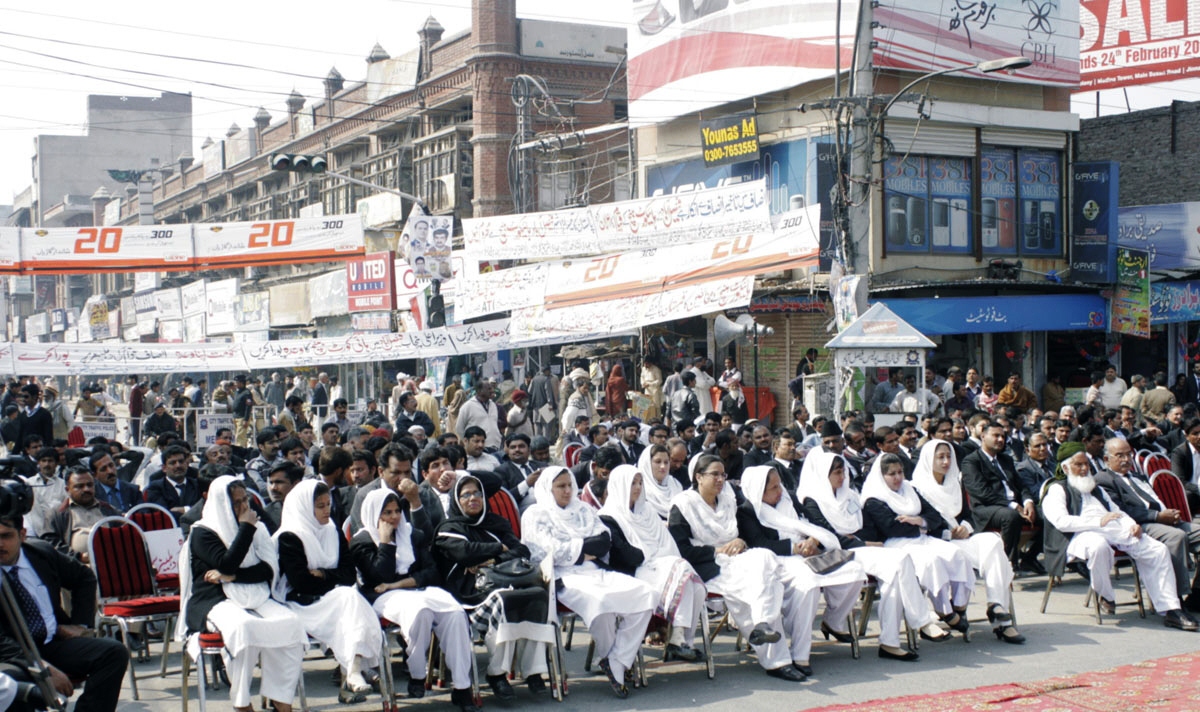
The role of women in professional spheres has been greatly emphasised in recent times for economies and societies to unlock their full potential. Worldwide, achieving goals of gender equality has become a norm for progress and prosperity. Women in various fields have been proving themselves and are on the forefoot in their quest to achieve financial independence, equal rights and opportunities.
In Pakistan, more and more women have been graduating with a degree in law despite few seeming to adopt the profession after a brief stint at law firms. Many complain of gender discrimination in the field and switch to professions that are more accepting of women. Nonetheless, success stories can also be witnessed in the country’s legal fraternity where women have been resolute and defiant against all odds in achieving their goals and have become credible professionals
Women advocates in an online panel discussion — organised by Women Of Wonders Pakistan — shed light on their respective journeys in the profession, issues and challenges they faced and discussed steps to encourage more female participation in the field of law.
Advocate Noor Ejaz said when she started working in 2015, the situation wasn’t very promising for women with mostly “male-dominated chambers”, She, however, endorsed the call to have more women join the legal profession owing to the “intellectual capacity” they bring in litigation.
“I have worked with women and found them to be more meticulous and invested in the work they do. We need the intellectual integrity which women can bring in...they genuinely strive for improvement,” Ejaz said, adding that women should have joined the profession a lot earlier to break the glass ceiling and ensure they are treated on equal terms.
Ejaz also stressed the need to create an inclusive and thriving space for young women who are entering the profession.
“If we don’t create this space it will shrink even more and so will the integrity of litigation in my opinion,”she said.
Ejaz further explained the common legal terms and added that in Pakistan a lawyer is considered an advocate.
“Practitioners, litigators present cases in courts while corporate attorneys deal with out-of-court work and corporate ventures,” she said, also elaborating the roles of sessions and additional sessions judges by virtue of book.
She added that she found mostfemale judges in the lower courts.
Continuing the conversation, Attorney at Law Fatima Khan, shared that she pursued law because she thought “it was ordinary yet extraordinary”.
“From running a school to making the constitution, you would know anything, it [the field] is so diverse” she said.
On being asked about the necessary skills needed to make it in the profession, Khan said aptitude for critical thinking and critical analysis really matters and so does the grades.
She, however, emphasised that the curriculum that is being followed in local universities needs to develop a more critical approach.
“Until we don’t critically analyse case laws and build arguments, we will not be able to produce good lawyers,” she underlined, adding that critical and deliberative approach really matters in litigation and advisory opinion-making.
Khan added that as far as law is concerned in the country, certain universities have maintained their merit while both local and foreign degrees can be availed within Pakistan.
Advocate Shiza Rehman, another panelist, too highlighted skills necessary for the legal profession.
“When we talk about skills for the profession,they have to be a mixture of both inborn and polished expertise. Communication skills, confidence level and critical thinking are vital,” Rehman added. “Presentation of cases and drafting skills too need greater emphasis.”
Growth opportunities
Lawyer, women’s rights activist and gender equality advocate Waiza Rafique while highlighting opportunities for growth in the profession for women said the dimension or sector chosen in the field greatly determines future prospects.
“When it specifically comes to traditional careers in litigation, unfortunately a structural pattern does not exist in law firms in Pakistan,”she said, underscoring that it is not specified as to when an internet will be promoted to an associate level and after how many years.
“A lot of it depends on the sector that you choose after law graduation.”
Challenges faced by women
Khan said having women mentors can be helpful in identifying and dealing with the challenges, citing her own example. She agreed that discrimination does exist in the profession but believed that issues are not difficult to overcome and sometimes require a bit of confidence.
“Harassment, intimidation and discrimination are some of the challenges we face but as we progress with diversity and inclusion and as women members increase in the fraternity, these challenges will eventually subside,” she hoped.
Meanwhile, Ejaz added to the discussion by pointing out the prevalence of class bias and said it was one of the issues women faced that needed to be addressed.
Women mentors
Speakers regretted not having enough women mentors in the field, citing that many women quit in the middle of their career due to enormous challenges.
“The few female mentors that do exist are playing a very positive role for fellow women in law,” Khan added.
Ejaz also talked about her association with human rights lawyer and activist Asma Jahangir, for whom she had worked as an associate.
Technology and law
The integration of technology in the profession was also discussed on the occasion.
Khan maintained that for in-house counsel and corporate environments, being technologically sound is a must but things were different for litigation.
“We have seen e-courses during this pandemic and even before that the Supreme Court used them for registry of different benches but things on the whole are very slow,” she said, adding that technology is coming into the litigation sector and slowly the courts were moving towards digitisation. “We have apps for the high courts but even to use them, investment in training is required. The staff being hired for this is not very technologically sound.”
Rehman claimed that senior lawyers were hesitant towards coming to digitisation as it involved a great deal of computer literacy.
“It is high time we start learning these skills and incorporate in our practices as it’s only the internet era ahead of us. Even doctors have turned to online check-ups,” she said.
Workplace harassment
The panelists also discussed and explained the Harassment of Women at the Workplace Act 2010 and elaborated that under its section 2H, multiple situations including unwelcome sexual advances, request for sexual favours or any communication of sexual nature causing discomfort to an individual constitute as sexual harassment.
Rehman added that everything has been well specified in the act but there is no “procedure implication”.
“Everything has been laid down but it is not being executed as it should be,” she said, adding that her team has been trying to amend the procedure.
“There are two remedies, either civil or criminal [in these cases] but from my research with senior lawyers I have got to know that these cases are still not taken up so seriously.”
Ejaz, who is looking after several harassment cases, said it has been extremely challenging to explain to courts about acts that can intimidate women and count as harassment.
She pointed out that there was a lack of sensitisation regarding the matter and the lens with which women see it as an issue was needed.
Agreeing with Ejaz, Khan said there has been improvement in the corporate sector where inquiry systems, code of conduct and committees exist to deal with cases of sexual misconduct.
She, however, said in the litigation sector, not concealing the identity of complainants has been an issue.
“As far as harassment is concerned, one needs to be very candid on this that it is not white or black. It can be grey any given day,” she added. “One it is grey it has to be made understood to the other side.”

1732020599-0/BeFunky-collage-(73)1732020599-0-165x106.webp)
1731926127-0/zayn-(1)1731926127-0-165x106.webp)
1732018399-0/BeFunky-collage-(72)1732018399-0-165x106.webp)




1732013598-0/Untitled-design-(15)1732013598-0-270x192.webp)
1732012115-0/Untitled-design-(14)1732012115-0-270x192.webp)







COMMENTS
Comments are moderated and generally will be posted if they are on-topic and not abusive.
For more information, please see our Comments FAQ